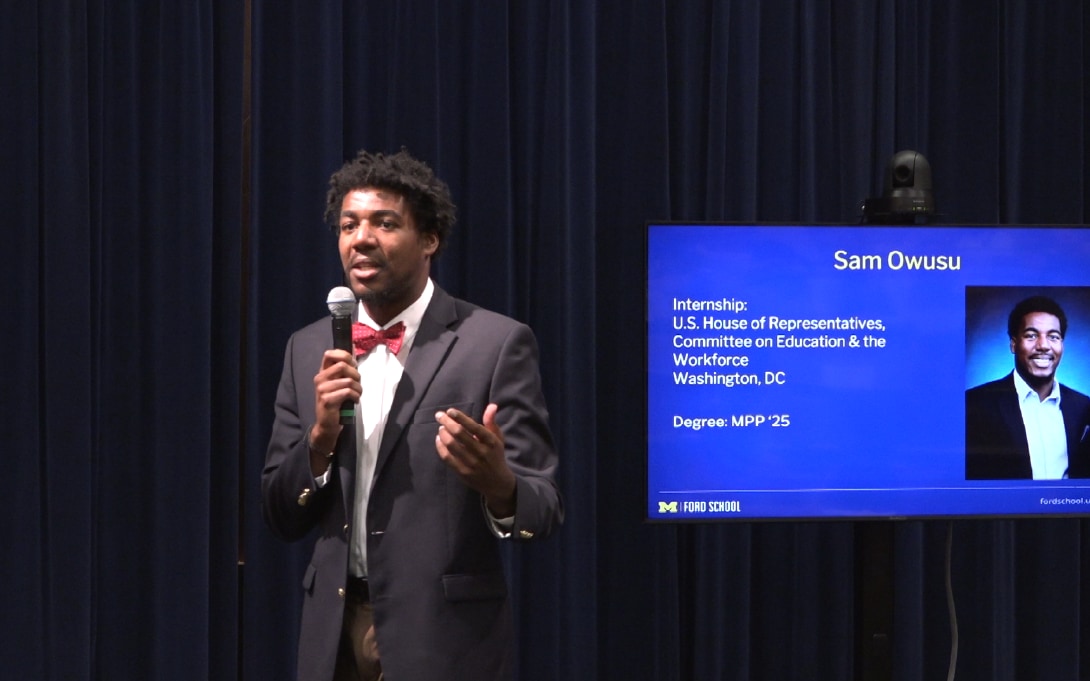
Eleven talented students showcased what they learned during their summer internship at the Ford School 7th Annual Policy Pitch Competition. Undergraduate and graduate students spent three minutes sharing their key deliverables, policy impacts, and lessons learned with the chance to compete for 1st, 2nd, and 3rd student prizes.
The panel of judges awarded students based on the clarity and effectiveness of the presentation, the potential policy impact of their work, and how it influenced the student’s long-term goals. Judges included: Yousef Rabhi, Washtenaw County Commissioner, Rohan Dharan (BA’13), Manager of Secondary Advanced and Enriched Instruction at District of Columbia Public Schools, and Latesha Love-Grayer (MPP’02), Director of International Affairs and Trade at US Government Accountability Office.
Samuel Owusu (MPP ‘25) – U.S. House of Representatives, Committee on Education & the Workforce
Good evening, everybody. How’s everybody doing?
Before I begin my pitch I’m going to take a quick post of the room. Who in here has ever done an internship? Who has ever done an unpaid internship? Who has ever turned down an unpaid internship because they couldn’t afford it?
Well, I think you guys are gonna like what I did this summer, because this summer I worked at the US House of Representatives, Education and Workforce Committee to end unpaid internships through legislative amendments.
I did that work in tandem with committee staff working to find data on internship participation and illustrate the inequitable access and participation of unpaid internships in this country.
Now for those of you who raised your hand and said that you participate in an unpaid internship know that about 40% of intern participants every year, or about 1 million students, also participate in those internships.
For those of you who said you had to turn down an internship because you couldn't afford it, know that 60% of surveyed students at colleges and universities also say the same thing.
If you're not white, male, or your parents didn't go to college, you're also less likely to access a paid internship opportunity, and we all know that internship opportunities are seen as door openers for employers. They reflect their interests, and they train students to become full-time employees. So, therefore, internships are becoming a pipeline of privilege, and not a door for opportunity for our students in this country.
We have to think really, critically about how to address this legislatively. We went to a little known law known as the Fair Labor Standards Act of 1938. And this law, when I mean little., it covers everything from minimum wage to mothers taking time out to take care of their children during a work day.
We decided that we wanted to target the primary beneficiary test, which is a small little fact sheet created by the DOL to essentially justify unpaid internships. Specifically for-profit companies have used this fact sheet in the primary beneficiary test to say, “Hey, you received college credit for this internship so therefore we don't have to pay you.” So, everyone in this room who got college credit or credit for something and got paid, know that your employer and the Ford School really looked out for you this summer.
We targeted clarifying this test through an amendment that would essentially say “For-profit companies, you can’t do this anymore. You can't support unpaid labor in this country through the primary beneficiary test because we believe you have the capacity to pay your interns, and many of them do.”
Now for nonprofits, it’s a different story. We decided to embed within our amendment. After talking to unions, advocacy nonprofits, and think tanks about a subsidy for nonprofits, thinking about how we can build up scale in our nonprofit sector, to support unpaid internships to take on paid opportunities, because we know that on average, students of color are more likely to take on unpaid internships in this sector, and they usually come from lower income backgrounds.
So this summer I got to play the role of the intern who fought on behalf of all interns to simply get paid for their labor, because we are all laborers. We're coming into this economy and contributing greatly to its productivity.
To end this presentation, I want to say that unpaid is unfair, which is our hashtag we're running with. So continue to tweet that out. As this bill gets to the floor hopefully in the 100 and 19th Congress. Thank you all for your time.
Read the other pitches:
Georgina Bailey – Lansing Board of Water & Light
Bridget Corwin – Great Lakes Renewable Energy Association
Audrey Dombro – City of Philadelphia, Office of Transportation and Infrastructure Systems
Nia Knox – UM Poverty Solutions
Emily Kuttner – City of Chicago, Mayor's Office
Alexie Milukhin – The Institute for College Access and Success (TICAS)
Samuel Owusu – U.S. House of Representatives, Committee on Education & the Workforce
Aiswarya Padmanabhan – Trust for Social Achievement
Katrina Wheelan – City of Detroit, Office of Budget
